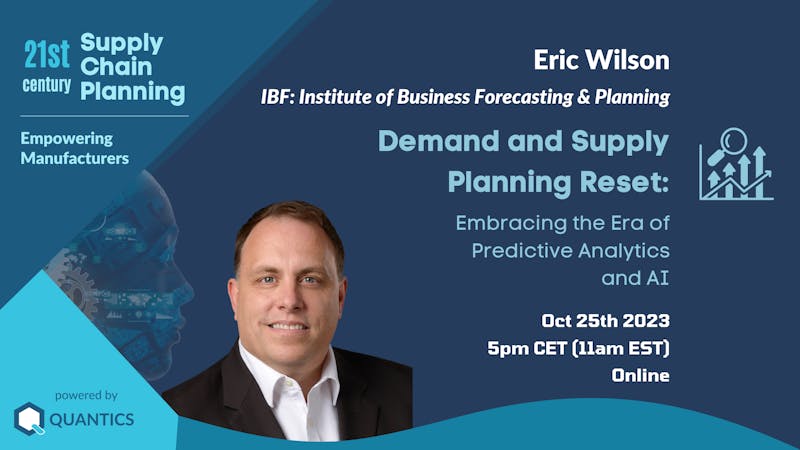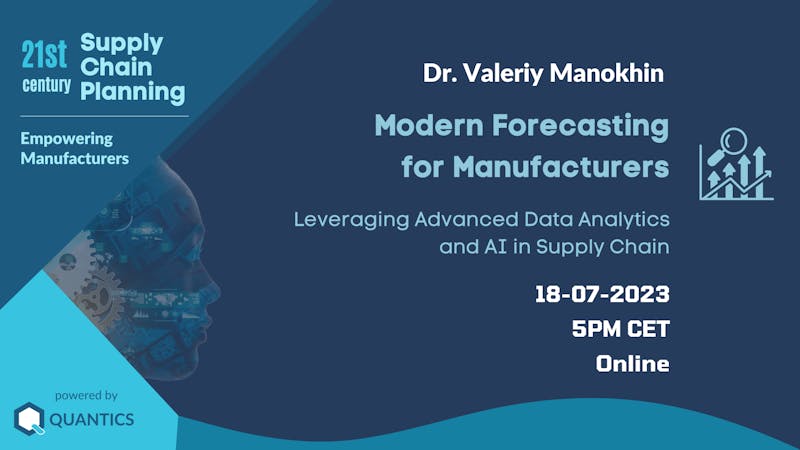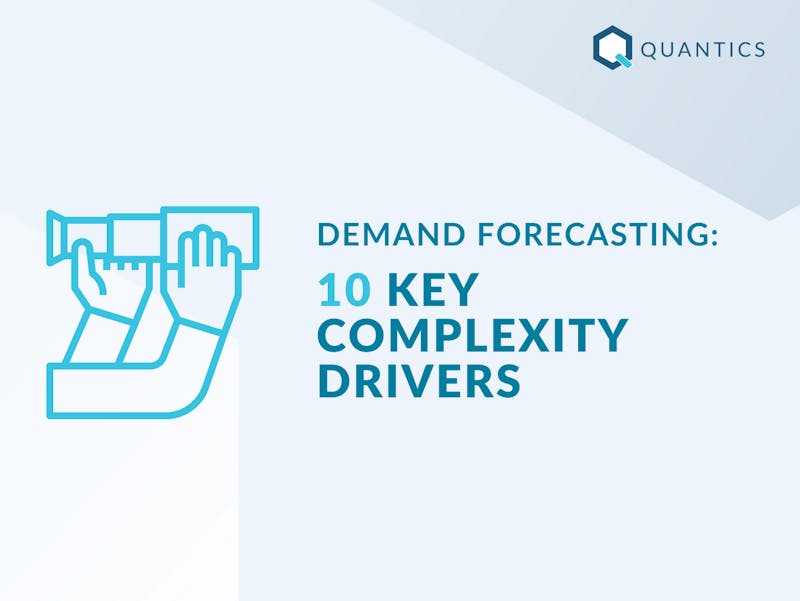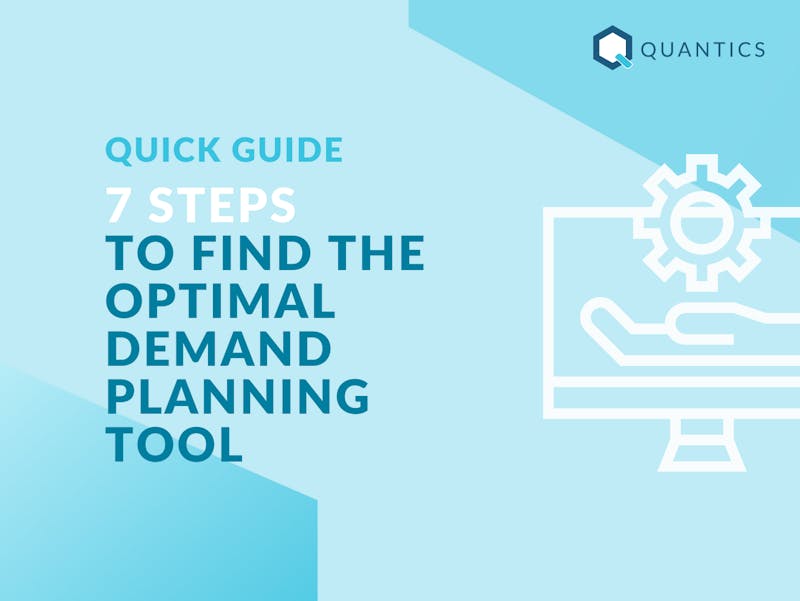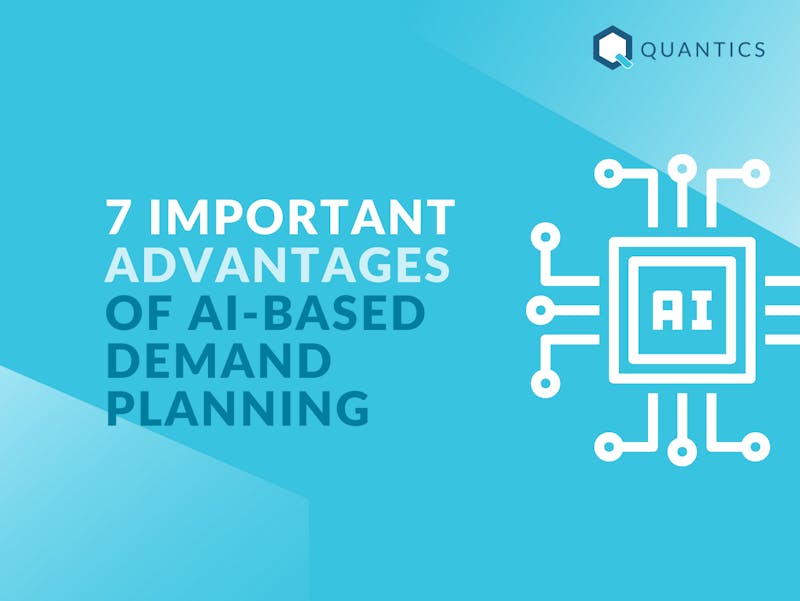Demand & Supply Planning Reset: Embracing the Era of Predictive Analytics and AI
The following is an excerpt from Quantics' webinar series "21st Century Supply Chain Planning: Empowering Manufacturers”. In this episode, Eric Wilson from Institute of Business Forecasting & Planning (IBF) shared his thoughts and insights with us on Predictive Analytics and AI. Let's dive in!
The Great Reset
Where are we going as an industry when it comes to forecasting, demand planning, and things that are imperative to the manufacturing world? What things are really driving manufacturing decisions and how is Predictive Analytics a part of that? What do we see change and what do we see continue to change?
Coming up with the right plan enables manufacturers to be able to plan and execute better going forward.
If we want to get to where we're going, we want to start with where we've been
In the early 2000s, the big topics, especially for people in the United States, were offshoring and outsourcing. A lot of companies were finding cheaper ways of manufacturing outside of their own four walls and a lot of discussions were happening as far as:
- Outsourcing manufacturing capabilities
- The need for external data
- Consumer habits were changing
Consumers were changing the way they were buying; they were going to more planned purchases, so companies needed to adapt their marketing capabilities.
By 2018, only 21% of companies were actually utilizing some type of external data in their planning. Two-thirds of companies were not using any external data despite the push to get external data into their planning processes. A lot of companies, 43%, were still utilizing Excel.
Then something happened in 2020
Overnight we saw a drastic change. Brand loyalty plummeted, with an estimated 75% of consumers trying new brands during the pandemic. Customers were no longer loyal to a certain brand because they had the anonymity to be whoever and to be able to buy from anywhere. A lot of people went to e-commerce. However, we still have shoppers out there prioritizing value-based purchasing.
Today, we're no longer talking about offshore or exporting manufacturing capabilities. We're actually looking at the exact opposite. In addition, the big thing we're seeing now is a push for external data, we're seeing a push to be able to plan externally for what's happening internally.
- 40% of companies are going for near-shoring, bringing manufacturing back inside their own four walls or at least next door.
- 53% of companies are not going to be single sourced anymore.
- 47% of companies are actively increasing inventory levels to be more competitive in the market or to make up for the variability that they're seeing in the market right now.
- 33% of companies out there are planning SKU reduction and segmentation of their items and customers.
- About two-thirds of companies went to some external data point to try to explain what was happening.
What we need to be able to do is adapt to consumers and how they're changing.
This brings us to where we're going
We are in the age of AI. Today has been coined “The year of AI and chat GPT”. We're seeing a lot of use cases and a lot of real utilization of AI, inside of manufacturing, inside of planning, to be able to do what you do better, to be able to sort data better, to be able to plan better.
Obviously it does not come without some caveats or some things to consider.
According to IBF research, AI and Machine Learning (ML) are going to have the biggest impact on forecasting and planning going forward.
However, I think Digital Twins is going to have a much bigger impact than shown here, it's just not utilized as frequently with a lot of organizations, but you're going to see it creep up.
AI has a lot of capabilities. It's an ambiguous term and I'm not a big fan of the term AI. That's the reason my book is called Predictive Analytics for Business Forecasting, because it's really underlining that AI is going to be the algorithm, it's going to be the Machine Learning, it's going to be the Predictive Analytics, it's going to be the the iterative type of processes that are put in place to allow machines to learn and rationalize in their own systematic way going forward. However, AI is a term we use and it can help achieve your business goals, it can enable manufacturing companies to do things faster and more efficiently.
What we're seeing is that companies utilizing AI are using advanced analytics to become more efficient rather than precise, especially in the manufacturing world. That's not to say that precision is then gaining as well, because AI can do a lot of things more precisely, more quickly as well, but the bigger ROI we're seeing right now for a lot of manufacturing is in efficiency.
AI can create well written content, but it lacks some sufficiency in depth and perspective. From a chat GPT standpoint, you can take that into a planning world and you can take that into the manufacturing world and it pretty much is the same thing.
It can do things well sometimes and it can do it many times a lot quicker, but sometimes it lacks depth, it lacks perspective, and it cannot fundamentally generate new thought processes on its own without being challenged, without being pushed to generate something. It simply looks at whatever has been done before and generates the mean or the average response to what everybody else has done. The human insights that are necessary to generate something exceptional, something above average, are not yet there when it comes to AI.
So ultimately, what we may end up with if we don't watch out, and without you, is mediocracy.
The problem I'm seeing is companies are going after new technologies without understanding the foundations that they have to have in place. If you have data problems, fix them, work on those data problems. If you’ve got people problems, you don't have the right skill sets, work on that. If you have process problems, you need to get the right processes in place. Then, as I said, AI becomes an enabler for the right people, processes, and THEN technology.
Ultimately, don't put the Chat GPT before the horse, don't put technology before the horse.
In summary
Number one, things have changed. There is a “new normal” out there, but seven years from now, there's going to be another new normal. Statistically, every six years we have some type of Black Swan or something that is a shock to our current supply chain, and statistically it takes a company about six to nine months to fully recover.
The other thing I hope you got out of this is that AI is life changing, but you have to have a healthy amount of skepticism. 95% of technological advances are meaningless, they don't maintain. Only 5% are going to be meaningful.
To maintain balance, it’s people first, then process, then technology. That said, you have to start investing in technology now. Companies like Quantics understand you can't get there in Excel. You’re going to have to invest in technology that is more data driven.
In choosing your technology, don't focus on the solution. You want to focus on your outcomes, what you want to accomplish, and then meet your solution to fit those outcomes. Again, don't put the technology before the horse!
Lastly, keep your workforce adaptable. In five years most of what you're hearing about is going to be obsolete in terms of technology, but the one thing that won't change is the people doing it. We have to adapt to new technologies, new innovations, so continuously invest in your people. This is going to be the backbone that will make you successful going forward.
Want to learn more about this topic?
This is an excerpt from "Demand & Supply Planning Reset: Embracing the Era of Predictive Analytics and AI” with Eric Wilson from Institute of Business Forecasting & Planning, on October 25th, 2023.
To watch the full episode, visit Quantics’ YouTube channel where we join Eric Wilson as he shares invaluable insights on the evolving landscape of demand planning, business forecasting, and supply chain management. Explore what the current landscape looks like and learn how to leverage predictive analytics to drive strategic decision-making. Gain practical insights and actionable strategies to harness the power of data and optimize your demand planning processes.
This is an episode of the Quantics' webinars series 21st Century Supply Chain Planning: Empowering Manufacturers. Please keep an eye out for future presentations, panel discussions and information sharing from experts focusing specifically on the needs of manufacturers.
Watch the Full Episode
"Demand & Supply Planning Reset: Embracing the Era of Predictive Analytics and AI” with Eric Wilson
Meet Our Expert: Eric Wilson
Eric Wilson is the Director of Thought Leadership for Institute of Business Forecasting & Planning (IBF), the world’s largest professional membership organization representing and fostering the growth in Business forecasting, Demand Planning, Predictive Analytics, and Sales & Operations Planning. Eric is a visionary in his field both as a practitioner for various industries, prolific writing and speaking, and for his research. He is the author of the book Predictive Analytics for Business Forecasting, Host of podcast IBF On Demand, an Advanced Certified Professional Businesses Forecaster (ACPF), and Recipient of the Excellence in Business Forecasting & Planning Award.
